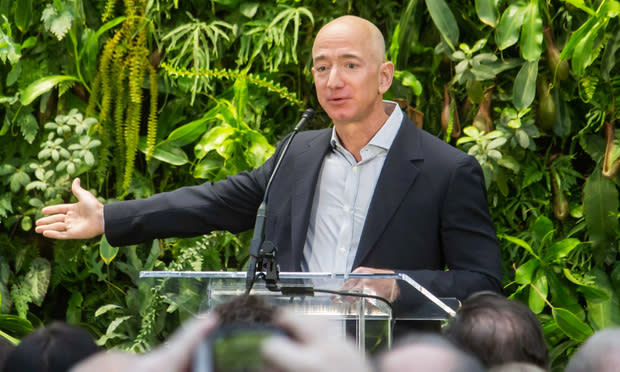Divorce Attorneys: In-House Counsel Should Stay Out of Executive's Divorce

Jeff Bezos at Amazon Spheres grand opening in Seattle. Photo by Seattle City Council via Wikimedia Commons.
The founder and CEO of Amazon.com Inc., Jeff Bezos, announced earlier this month on Twitter that he and his wife of 25 years plan on ending their marriage. Divorce attorneys say his in-house team will most likely not be involved in the divorce unless absolutely necessary.
Though Bezos said in the Jan. 8 tweet that he and his soon-to-be-former wife will remain friends, it is unclear how their divorce will impact Amazon's day-to-day operations.
“Ideally, with a company the size of Amazon, it is running irrespective of what is happening in their personal lives,” divorce attorney Brian L. Webb said.
Webb, the founder of Webb Family Law in Dallas, said that when he takes an executive as a client in a divorce filing he takes stock of how he would be able to use the in-house attorneys as a resource.
“Typically what you’re going to do is explore to what extent you can use them as a resource and be very aware of what their conflict situation might be so that you don’t inadvertently put them in an uncomfortable position,” Webb said. “They are an incredibly valuable resource.”
He said the in-house team tends to have a great knowledge of what the values and assets of the company are. But it is not a good idea to have a member of the in-house counsel team as an active member of an executive’s divorce counsel team. Webb explained the executive will need someone who knows how the process works and someone who will tell them what they need to hear.
“We who do this for a living snicker about nondivorce lawyers who want to jump in,” Webb said. "It’s just a different kind of an animal."
Ultimately, it is important for the in-house team to keep doing what it usually does, Webb said. He explained that one of the more important things in-house counsel can do is to not shred documents that they would not normally shred.
Michael Stutman, a divorce attorney at Stutman, Stutman & Lichtenstein in Manhattan, said that it is important for in-house counsel to remember that they represent the company and not the personal affairs of the executive. As an outside divorce attorney, he said there may be times when trade secrets or customer lists become involved.
“However, the line between those two roles may not be as bright as everyone wishes it might be,” Stutman said. “Oftentimes, I believe an executive may not be aware that certain communications between that person and corporate counsel would not be privileged.”



